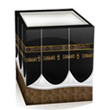On openly criticising the Muslim ruler.
- Details
- Category: Sheikh Al Fawzan
- Published on Wednesday, 13 November 2013 11:55
- Hits: 1511
On openly criticising the Muslim ruler.
Question:
Is it permissible to openly criticise the Muslim ruler in front of a gathering and the people?
Answer:
We have spoken about this issue many times before! It is not permissible to speak about the rulers because this brings about evil and differing in the society and it splits the unity of the Muslims and cause hatred between the ruler and the ruled. And this splitting and evil leads to rebellion against the ruler and the shedding of blood and matters which have blameworthy consequences. So if you have a comment about them, take it to the ruler secretly by visiting him, if possible, or by writing to him or by informing someone who can convey it to the ruler as a sincere advice to him, and it should be done secretly not openly and this has been mentioned in the hadeeth, "Whoever wishes to advise the ruler, then let him not mention it in public, rather let him take the ruler by his hand. So if he listens then that is that, and if not then he has fulfilled that which was upon him." And this meaning has been reported from the Messenger of Allaah (sallallaahualaihi wasallam).
Shaykh Saalih al-Fawzaan
Al-Ijaabaat al-Muhimmah fee Mashaakil il-Mudlahimmah" by Muhammad bin Fahad al-Husayn
Translated by Abul-Irbaad Abid Zargar
http://www.salafitalk.net





















